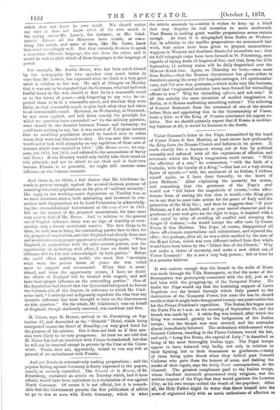Victor Emanuel's letter to the Pope, transmitted by the hand
of Count Ponza di San Martino, at least shows how profoundly the King fears the Roman Church and believes in its power. It reads exactly like a document wrung out of him by political necessity and softened with all the expressions of affection and reverence which the King's imagination could invent. " With the affection of a son," he commences, " with the faith of a Catholic, with the loyalty of a King,"—that last not a very strong figure of speech,—" with the sentiment of an Italian, I address myself again, as I have done formerly, to the heart of your Holiness." After explaining the necessity for action, and remarking that the greatness of the Pope's soul would not " fall below the magnitude of events,"—the affec- tionate form of stating the fear that it would, the King goes on to say that he must take action for the peace of Italy and the protection of the Holy See ; and then he suggests that " if your Holiness, as I do not doubt, and as your sacred character and the goodness of your soul give me the right to hope, is inspired with a wish equal to mine of avoiding all conflict and escaping the danger of violence,"—he would accept the offer sent by Count Ponza di San Martino. The Pope, of course, disappointed all these affectionate expectations and solicitations, and rejected the offer ; but perhaps, after all, he was a little soothed by the tone of the Royal letter, which was very different indeed from that which would have been taken by the " Eldest Son of the Church." Why not make a virtue of necessity, and make a new eldest son of Victor Emanuel ? He is not a very holy person ; but at least he is a genuine believer.






























 Previous page
Previous page